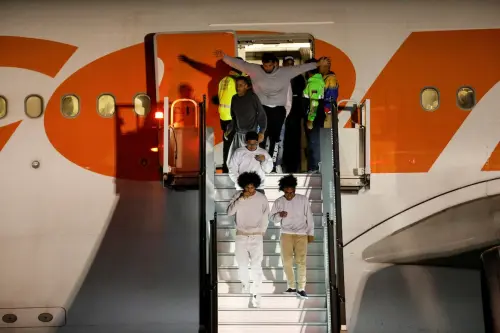A U.S. appeals court judge remarked that Nazis had more rights to contest their removal from the United States during World War II than individuals deported by the Trump administration.
During a contentious hearing, U.S. Circuit Judge Patricia Millett questioned government lawyer Drew Ensign about whether Venezuelans targeted for removal had the opportunity to challenge the assertion that they were members of the Tren de Aragua gang before being deported to El Salvador. Millett stated that “Nazis got better treatment under the Alien Enemies Act than has happened here.” Ensign countered, asserting that the analogy to Nazis was disputed.
Prior to its invocation by the Trump administration, the Alien Enemies Act had been used sparingly in U.S. history, most recently to intern Japanese, German, and Italian immigrants during World War II. The Trump administration sought to halt a two-week ban imposed by U.S. District Judge Boasberg on March 15, which prevented the use of the law to justify the deportation of alleged Tren de Aragua members without final removal orders from immigration judges.
Family members of many deported Venezuelan migrants raised concerns about the evidence used for removal. Lawyers for one deportee, a Venezuelan professional soccer player and youth coach, argued that U.S. officials misidentified him as a gang member based on a crown tattoo that referenced his favorite team, Real Madrid.
Millett, appointed by former President Barack Obama, is part of a three-judge panel on the U.S. Court of Appeals for the D.C. Circuit reviewing the government's challenge to Boasberg's order. U.S. Circuit Judge Justin Walker, appointed by a Republican president, appeared more supportive of the government's position. The third judge, Karen Henderson, was appointed by President George H.W. Bush. The court has not disclosed when it will issue a ruling.
The case is significant as a test of the legal boundaries of executive power, particularly with Republicans largely aligning with the president's agenda in Congress. Federal judges often serve as a check on the administration's executive actions.
In a court filing, government attorneys informed Boasberg that they would not provide further details about the deportation flights, citing state secrets privilege, which allows the government to withhold information that could jeopardize national security in legal proceedings.
Following Boasberg's temporary halt on deportations, Trump called for his impeachment, which could lead to removal. Chief Justice John Roberts later stated that appeals, rather than impeachment, are the appropriate response to disagreements with judicial decisions. Trump has maintained that it is the judiciary, rather than his administration, that is overstepping its bounds.
During the hearing, Ensign asserted that Boasberg's order needed to be paused, claiming the judge had overstepped by questioning presidential decisions on foreign affairs. Walker requested examples from Lee Gelernt, an attorney with the ACLU representing some Venezuelan migrants, of instances in which courts have upheld restrictions on presidential national security actions.
Gelernt argued that due process rights should not be viewed as a threat to national security. In a 37-page ruling, Boasberg had previously declined the Trump administration's request to lift the two-week ban, emphasizing that individuals must be able to contest the government's claim that they are members of Tren de Aragua before they face deportation.
Boasberg is also considering whether the Trump administration violated his order by proceeding with deportations after his ruling. The judge noted that the administration appeared to have "hustled people onto those planes" to evade a potential court order restricting deportations.
On March 15, the Trump administration deported over 200 individuals to El Salvador, where they are being held in the country’s extensive anti-terrorism prison, part of a $6 million agreement with President Nayib Bukele's government.
Boasberg's ruling affects five plaintiffs represented by the ACLU, as well as other Venezuelans in the U.S. at risk of removal under the Alien Enemies Act. The judge did not address the status of the migrants now detained in El Salvador. In a court filing, the ACLU urged Boasberg to mandate the return of migrants to the U.S. if it is determined they were deported in violation of his order. The ACLU indicated that eight Venezuelan women and a Nicaraguan man were among those flown to El Salvador but were later rejected by the government and returned to the U.S. One of the Venezuelan women recounted overhearing a U.S. official discuss an order stating they "can’t take off."
